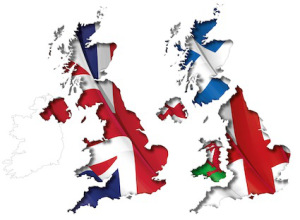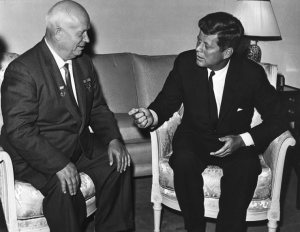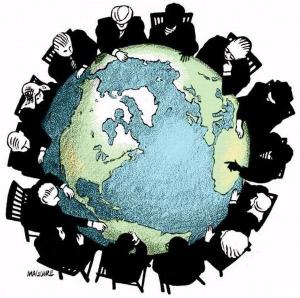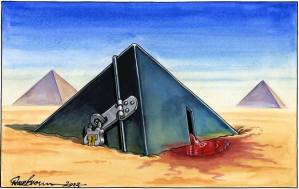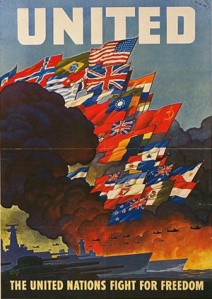By Ian Howarth
The United Sates has to play a difficult balancing act with its policy in the Middle East, on the one hand it supports the state of Israel and guarantee’s its national integrity, and on the other is its reliance on Oil, and Arab demands for action on the question of Palestine. This balancing act has over the decades since Israeli independence not always been successful, with the USA at times finding itself forced by Israeli unilateral actions into opposing Arab states and suffering economic catastrophes as a result. The nature of the complex relationship between the State of Israel and the United States can be examined through four key issues that present US policy-makers with significant obstacles when trying to influence Israeli policy.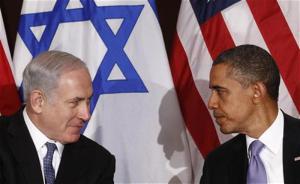
1, American Israeli Public Affairs Committee (AIPAC)
2, Congress and American Politics
3, US Financial and Military Aid
4, Democracy and Shared Values
The American Israeli Public Affairs Committee (AIPAC):
There has been much written and discussed about the power and influence of what is sometimes called the ‘Jewish Lobby’ in Washington and as such its role in formulating US policy towards Israel. Despite the numerically small number of Jewish Americans (although the 6 million living in the United Sates is the largest population outside of Israel, with the largest concentration in New York) AIPAC has been very successful in lobbying the United States Congress and in maintaining a strong level of support for the State of Israel amongst the American public.
The question of Israeli-Arab relations becomes a key debate in almost all electoral processes within the United States, with candidates that present positions contrary to those of AIPAC receiving strong condemnation and ridicule in the press, as well as suffering from difficulties in raising the all-important cash that keeps the US political system ticking.
In every American presidential election campaign since 1948 all the major candidates seeking nominations from both the Republican and the Democratic Parties have stated that they are true friends of the Jewish people and would be staunch allies of Israel in office. In return for the favourable positions taken by US Presidents towards Israel, AIPAC donates vast quantities of money to their campaigns, and to ensure a guaranteed pro-Israeli president it backs both horses in the race ensuring itself a voice in the next administration.
AIPAC has been and remains the most powerful of Washington lobby groups, guaranteeing positions for its supporters within the key cabinet departments with direct policy control over Middle Eastern affairs. Despite the obviously sinister undertones of the concepts of powerful back room lobbies forcing policy decisions on the back of a cheque book, AIPAC is not an illegal organisation, nor does it act illegally but works entirely within the tenets of the American political system.
The key difference between itself and all the other lobby groups is that it has been so successful, and more importantly its successes lie in a distinct and controversial area of American policy with the rest of the world. Whereas the energy and tobacco lobbies have less of a public profile, yet have in their own measure the same types of influence on the Oval Office in their policy areas. AIPAC has maintained itself in a strong position within American politics by remaining consistent, and outside of issues of domestic controversy, focusing its efforts on maintaining the worlds superpower as Israel’s friend. It hasn’t mistakenly aligned itself to one candidate over another and as such lost influence in an unfavourable outcome. It constantly bombards American public opinion with pro –Israeli positions, and gains the endorsement of almost all major American politicians whether they are Republican or Democrat, and flirts with celebrity and Hollywood, fashion and academia, all of which in effect has meant that Israel as a concept has become as American as Apple Pie.
Congress and American Politics:
It is the Senate that holds the keys to American foreign policy, any treaty the President signs on behalf of the United States must be endorsed by the US Senate, if not the treaty is null and void, e.g. Kyoto, and the League of Nations. The Senate with the House of Representatives hold sway over almost every aspect of US domestic policy, and any presidential initiative on health, social welfare or education must pass the House of Representatives, and any appointments to the Presidential Cabinet, the Joint Chief’s, and the Supreme Court must pass Senate Committee Approval.
The United States system of government is premised on the ‘Balance of Power’ so that effectively no one person can do anything without the support of significant factions within each and every stage of the American government. Therefore if an American President were to announce a radical change in direction regarding US policy towards Israel, it would require majorities in all the key positions of power within the United States.
Furthermore the biggest stick with which the President could beat an Israeli Government into touch with, is in fact not under his direct control, but that of Congress. The ‘$5 billion’ (Said 1995: XXIV) a year in loans and armaments that the United States grants the Israeli government at such favourable rates that they almost meet the criteria of grants. Therefore the composition of the Congress is essential in setting US policy in the Middle East, and as such AIPAC is at its most effective in this arena, supporting almost every candidate to the House and the Senate, and opposing those who they don’t. This has meant that there has been a pro-Israeli majority in both Houses since Israel’s independence.
AIPAC can therefore ensure that if the Presidency were to take what they would deem to be an anti-Israeli position they could pull the financial strings in congress and disrupt the full spectrum of presidential initiatives currently in the House, meaning that the AIPAC could in effect bring down for example a new Health Bill if the White House was unresponsive to its position. This is really hardball politics, and although it seems underhanded it’s how all politics is effectively done in America. It is therefore arguable that the American system of government is systemically adverse to major policy changes, or reforms, as the majorities required to bring about such change are so large.
US Financial and Military Aid:
The amount of financial assistance the United States provides Israel with both financially and militarily is significant, amounting to around ‘$5 billion dollars a year’. (Said 1995: XXIV) The terms of this assistance are such that it is effectively a grant, with no set repayment schedule, and no tough enforcement of interest re-payments, with Israel having the latitude to defer payments on its loans for as long as it deems necessary in the name of national security. Aside from this yearly dose of cash Israel also benefits from effectively being a military outpost of the United States in time of conflict. For example during the Yom Kippur War (October 1973), the United States under US Secretary of State Henry Kissinger’s direction ‘moved the carrier USS Independence and three destroyers to within 500 miles of the Israeli coast’ (Paterson & Merrill 1982: 682) in order to provide air defence should Israel come under attack.
Furthermore during the same conflict while Kissinger directed the United States within the United Nations to push for a cease-fire, with itself as the mediator negotiating with Egypt, it conducted a secret re-enforcement of Israeli forces, with American tanks, planes, and sophisticated weapons. The ‘US Congress passed emergency legislation that provided Israel with $2.2 billion dollars to pay for these weapons’ (Paterson & Merrill 1989: 683). This amount marked a watershed in US-Israeli relations in both terms of cash amount, and the qualitative cost of the new weapons with the ‘Pentagon estimating that $850 million’ (Paterson & Merrill 1989: 683) was sufficient to cover the cost of the weapons. ‘Spokesmen for the [Nixon] administration were unable to tell Congress exactly how $1 billion of the total $2.2 billion would be used, though Congress, in its zeal to demonstrate support for Israel, was apparently not disturbed by this lack of information. Moreover $1.5 billion of the total $2.2. billion was to be an outright grant, entailing no repayment. Kissinger is said to have argued for even more-at $3 billion and all in outright grants…’ (Patterson & Merril1989: 683)
The financial and military assistance provided by the United States is therefore a major consideration in any discussion amongst American foreign policy makers as it provides the potential for enormous leverage over Israeli policy. While at the same time it equally ties the United States to the fundamentals of maintaining Israel’s security.
Democracy and Shared Values:
Israel is the only democracy in the Middle East and in many American eyes that is all that counts when it comes to dictating US support for Israel. Although in essence this is true, Israel is not a Liberal Democracy. Arab Israelis live in a form of political segregation with limitations on their rights of representation, as a result of Zionist fears of Arabs seizing the state from within. There is a total lack of Palestinian representation within the Israeli political system; this is despite its forty six year occupation of the Palestinian territories. Israel has made no attempt to integrate any part of Palestinian society with its own, preferring to force Palestinians off their land replacing them with Israeli settlers as a means of integrating the West Bank and Gaza into Israel proper.
The position Israel holds as the closest thing to a democracy in the region has been an essential factor in US relations with Israel, even when US Presidents have taken a harsher tone with Israel in the end they are forced by the stark conflict between Arab absolutism and terrorism and Israeli democracy. America after all is the land of the free, and the leader of the free world, and to take a position that failed to recognise the legitimacy of the Israeli states democracy in the face of the Arab world’s monarchs and dictators would be to invite a domestic political crisis.
Ultimately Israel has benefited far more than the USA in this relationship, the ties that bind the USA to Israel are so great that it is inconceivable for a US President to force an Israeli Prime-Minister into a position that they don’t support. This is despite the fact that Israel’s national security is wholly dependent on the financial and military aid and guarantees of the United States.
This statement is proven in my opinion by Israel’s pre-emptive actions against Lebanon, Iraq, and in the 1968 War, when Israel pre-emptively attacked Egypt, and Syria, seizing the Sinai, and the Golan Heights with limited prior consultation with the USA. This action despite the US’s objection to the policy was ultimately fully endorsed by the United States, who provided critical international diplomatic cover in the UN Security Council. It was the use of the United States’ veto at the Security Council that gave Israel the necessary time to encircle the Egyptian Third Army in the Sinai, before the enforcement of the cease fire.
In fact the Israeli army continued with hostilities against the Egyptians for forty-eight hours after the cease fire came into force. This action was completed covertly under the cover of Secretary of State Kissinger’s claim that the Israeli forces were merely taking up defensive positions, when in fact they were securing the complete encirclement of the Third Army, an action led by Ariel Sharon as a senior Israeli tank commander, Sharon wanted to annihilate the 3rd Army. However Kissinger managed to bring about his only piece of decisive intervention in the Israeli plans by persuading Israeli Prime Minister Golda Meir that such an action would cripple Nasser’s military regime and lead to the collapse of Egypt into civil strife. This would have created a situation that would be highly hazardous on Israel’s borders, and ultimately prevent Israel’s ambition of a negotiated peace with Egypt, that recognised the state of Israel, and fractured the Arab alliance set against them. This US involvement on the side of Israel in the 1968 War was to its strategic disadvantage leading to the first OPEC Oil embargo, and a worldwide economic recession. Israel on the other hand secured the military defeat of Egypt and Syria, and made substantial territorial gains.
Case Study: The Oslo Peace Process 1993 – 2000
The Oslo Peace process is in my opinion the best example of the difficulties faced by the United States in influencing Israeli policy in the Middle East and in particular in effecting a just settlement for the Palestinian people. President Clinton was at first not a particularly promising prospect for the world when it came to American involvement in international affairs. One of his very first actions as President was a unilateral US withdrawal from Somalia, an action that left the country in an arguably worst state than that which the action had aimed to remedy. There was also dithering over Bosnia, Rwanda and Haiti. Therefore when months of secret negotiations between two Israeli academics and members of the PLO were revealed and given US support in 1993, and the land for peace agenda was agreed by Arafat, and Rabin in the signing of the accord in the Rose Garden before the worlds press, with ‘that’ handshake, it was something of a dramatic breakthrough in American Israeli relations, with America apparently actively pushing Israeli into finding a peaceful solution to the Palestinian question.
However this was from the start a farce, Oslo took ‘the peace steam-roller… [Into]… a new, and much more destructive phase. Far from bringing peace, it brought greater suffering for Palestinians, and assured harm to the long term interests of the Israelis as a people.’ (Said 1995: 146-147) The entire proposition of the Oslo peace process that of land for peace was flawed in its inception; the land that Israel wished to trade with the PLO was not it’s to trade. In essence for Israel to trade the land required the tacit acceptance of the Palestinians and the PLO of the Occupation, a condition that has never been conceded by any national liberation movement to a military occupation.
This is effectively what occurred with the signing of the Israeli-Palestinian Declaration of Principles on the White House Lawn on that September afternoon, it was the first steps in the creation of what Christopher Hutchens in his foreword to Edward Said’s book ‘Peace and Its Discontents’ refers to as a ‘refugee state’, wholly dependent on Israel for security and access to world trade. Palestine was not to become a state for the Palestinians, its fractured borders, potted with Israeli settlements, it would be a decapitated territory joined together by a narrow ‘international road’ linking the Gaza strip with what’s left of the West Bank. This would have created an unsustainable political entity crippled by economic weakness, lacking any sense of unified identity, and ultimately unable to act as a sovereign power in the defining areas of defence and security with the Israeli Defence Force being the only military entity allowed to operate within the area. This was not a Palestinian State, it was a humiliation and ultimately was destined to only increase the sense of hopelessness and bloodshed, and Oslo in its deceit was the foundation stone of the second intifada, and the eventual rise of Hamas to power in the Gaza Strip.
Oslo was about the ambitions of two men, Rabin and his dream of secure Israeli borders with the subjugation of Palestinian and Arab hostility through a botched and uneven peace, and Arafat a man who cared more about being called Mr President than the suffering of his own people. This was only compounded by the grand standing ambitions of America’s first diplomat. Clinton saw Oslo as a route out of the Israeli-Palestinian quagmire that could be accepted by Arab States. The goal being Arab Oil, by removing the instability the Palestinian issue provided within Americas strategic and contradictory interests within the region, that of Israel’s guarantor and Americas reliance on Arab Oil.
The reason why I have highlighted Oslo as an example of Israeli influence over US policy rather than vice versa, is that the simple solution to Americas contradictory positions within the region is the pro-active engagement with Israel on the status of the ‘occupied territories’ from the position of UN Resolutions 242, and 337 ‘which state that no state can hold on to territory taken by force’, such an approach would secure Arab Oil, yet maintain Israeli security. However it would not fulfil Zionist territorial ambition and the desire amongst some sectors of Israel’s political establishment to see the Palestinians utterly defeated before any peace, as if 46 years of occupation hasn’t been enough.
However the United States shunted the UN aside and began negotiations from the basis of the West Bank and Gaza Strip as Israeli property with which to negotiate and to also negotiate the existence of Israeli settlements, vast hilltop fortresses that occupy strategic advantages, and dominate the land around, no state could countenance such a situation. Yet Arafat in his own self-obsessed egotism signed away a key position in 1993, a position set out in ‘The Palestinian National Covenant’ (1968) ‘The Palestinian Arab people possesses the legal right to its homeland, and when the liberation of its homeland is complete it will exercise self-determination solely according to its own will and choice.’ (Paterson & Merrill 1989: 641) Two equal states with mutual respect for each other, was about to be sacrificed for what the Zionists have determined to be the most achievable outcome of a Greater Israel and a dependent gutted and broken Palestine.
The failure of the Camp David talks in 2000 have often been described as the result of Yasser Arafat’s intractability, however in the context of what I have just described his failure to reach agreement with prime minister Barak was due to his realisation that the peace process was no longer washing with his public, he sensed the coming storm and decided not to be at sea when it came. The rapid descent into violence and it’s ferocity as well as actions taken by the right wing anti-agreement parties within Israel suggest that organisations such as Hamas and Islamic Jihad were already planning their response to Israel and Americas ‘best offer for peace’ some time before that doomed meeting in the woods of Maryland.
Arafat realised far too late that his bid for power was about to be revealed as just that, and that the sham of a state he was about to agree too wouldn’t last such a revelation, furthermore he also realised that if he tried to pull it off it would be the end of him politically, and would probably cost him his life. Therefore ever the pragmatist he changed streams and retreated to his bombed out headquarters leading the battle for Palestinian liberation, as though the 1990’s never happened and he had simply moved the venue from Beirut to Ramallah.
The power of Israel over the policies of the United States can be overstated, Israel does not dictate US relations with Europe, nor have a veto on US economic concerns in the Middle East, but when it comes to a choice between Israel and the Arabs, the United States will always choose Israel. This is not because she is consciously biased or because of some sinister anti-Arab plot, but for a number of reasons, the political structure of America being one, and also because Israel is in many ways a child of America, and the only banner of American style values in the region. As long as this is true and as long as it is plausible that an Arab army will threaten Israel the United States will continue to defend Israeli interests in the Middle East.
Bibliography:
Hyland, William G. (1999) ‘Clintons World; Remaking American Foreign Policy’ Hyland, Westport Connecticut, USA, chp12, p156-158
Paterson, Thomas G. Merrill, Dennis. (1989) ‘Major Problems in American Foreign Relations, Volume II: Since 1914’ (4th Edt.) Heath, Lexington Missouri, p641,642,643,644,682,683
Said, Edward W. (1995) ‘Peace & Its Discontents; Gaza – Jericho 1993 – 1995’ Vintage, London, pXVI-XVII & p144,145,146


